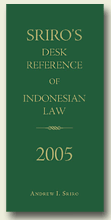By the Book: The ABCs of Indonesian Law

The Jakarta Post
Bookmarks
May 22, 2005
By Thang D. Nguyen
You might ask yourself, "Why would anyone read a book on Indonesian law?"
It is because navigating the Indonesian legal system is like a walk in an unfamiliar jungle at night. So, if you have to deal with Indonesian law, let Sriro's Desk Reference of Indonesian Law be your guide.
Not that Indonesia lacks laws. As a matter of fact, it has tens of thousands of them.
To start with, Indonesia has the French-inspired Dutch civil laws; that is, laws on the books when Indonesia was a colony of the Netherlands. Today, some of the Dutch laws are still in effect and used in Indonesian courts.
Then there are Indonesian laws, which were enacted during the post-colonial period and are heavily influenced by principles of continental European civil law, Anglo-Saxon common law, Islamic law and traditional, unwritten Indonesian adat , or customary law, systems.
This mixed theoretical system makes Indonesian law difficult to understand and seemingly inconsistent.
But worst of all, the Indonesian legal system is corrupt. At the top level, one has to deal with corrupt lawyers and judges who make court rulings in favor of the rich and powerful. In the middle, one faces incompetent, corrupt bureaucrats who delay the legal process, unless they are bribed. And at the bottom, one has law enforcing authorities, e.g., policemen, who are poorly paid and will, therefore, do anything for money -- depending on the size of the bribe.
Thus, justice does not serve the honest, the poor or the weak. But not having money to pay their way through the Indonesian judicial system is not the only reason why a just cause may lose. The other, more important, reason is that most people simply don't have adequate access to Indonesian laws; they just do not know their rights.
As Andrew I. Sriro, an American lawyer who knows and practices Indonesian law, writes:
"If people do not have access to the law, they cannot know their rights. If people do not know their rights, they cannot demand the enforcement of their rights. [And] if people are not empowered to demand the enforcement of their rights, they will be exploited and abused by those with access to power over the law."
With sections on the Indonesian government and judicial systems, business organizations and commerce, debtor-creditor rights, labor law, family law, intellectual property, immigration and, among others, a handy list of treaties and conventions to which Indonesia is party, this reference serves more than just the average Indonesian.
Businesses and government officials -- both Indonesian and foreign -- employers and employees, expatriates, foreign spouses of Indonesians, foreign retirees living in Indonesia and anyone who has to deal with Indonesian law at all will find Sriro's Desk Reference of Indonesian Law a useful tool.
In plain English -- soon to be available in Bahasa Indonesia -- and a reader-friendly structure, the book defines for readers and explains to them the implications of Indonesian legal concepts that are typically difficult to understand.
Thus, even if you are not involved in a lawsuit under Indonesian law, it would be wise to have a copy of this book on your desk or in your library; it may come handy someday.
The British scientist Francis Bacon once rued: "Knowledge is power." The ignorance of your rights, therefore, becomes somebody else's power that can be used against you.
Tip the scales of justice back in your favor: Get a copy of this book.
The reviewer is a Jakarta-based columnist. He writes frequently on Indonesian affairs and has published several books, including Indonesia Matters: Unity, Diversity, and Stability in Fragile Times by Times Editions.

0 Comments:
Post a Comment
<< Home